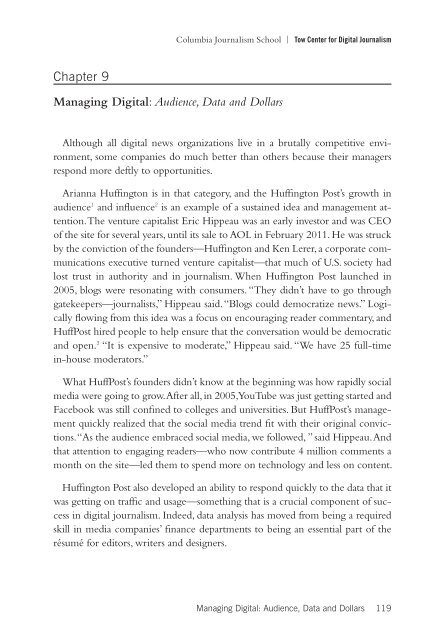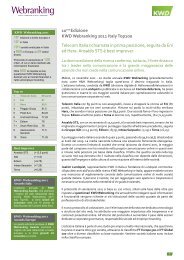What We Know About the Business of Digital Journalism
What We Know About the Business of Digital Journalism
What We Know About the Business of Digital Journalism
You also want an ePaper? Increase the reach of your titles
YUMPU automatically turns print PDFs into web optimized ePapers that Google loves.
Columbia <strong>Journalism</strong> School | Tow Center for <strong>Digital</strong> <strong>Journalism</strong>Chapter 9Managing <strong>Digital</strong>: Audience, Data and DollarsAlthough all digital news organizations live in a brutally competitive environment,some companies do much better than o<strong>the</strong>rs because <strong>the</strong>ir managersrespond more deftly to opportunities.Arianna Huffington is in that category, and <strong>the</strong> Huffington Post’s growth inaudience 1 and influence 2 is an example <strong>of</strong> a sustained idea and management attention.The venture capitalist Eric Hippeau was an early investor and was CEO<strong>of</strong> <strong>the</strong> site for several years, until its sale to AOL in February 2011. He was struckby <strong>the</strong> conviction <strong>of</strong> <strong>the</strong> founders—Huffington and Ken Lerer, a corporate communicationsexecutive turned venture capitalist—that much <strong>of</strong> U.S. society hadlost trust in authority and in journalism. When Huffington Post launched in2005, blogs were resonating with consumers. “They didn’t have to go throughgatekeepers—journalists,” Hippeau said. “Blogs could democratize news.” Logicallyflowing from this idea was a focus on encouraging reader commentary, andHuffPost hired people to help ensure that <strong>the</strong> conversation would be democraticand open. 3 “It is expensive to moderate,” Hippeau said. “<strong>We</strong> have 25 full-timein-house moderators.”<strong>What</strong> HuffPost’s founders didn’t know at <strong>the</strong> beginning was how rapidly socialmedia were going to grow. After all, in 2005, YouTube was just getting started andFacebook was still confined to colleges and universities. But HuffPost’s managementquickly realized that <strong>the</strong> social media trend fit with <strong>the</strong>ir original convictions.“As <strong>the</strong> audience embraced social media, we followed, ” said Hippeau. Andthat attention to engaging readers—who now contribute 4 million comments amonth on <strong>the</strong> site—led <strong>the</strong>m to spend more on technology and less on content.Huffington Post also developed an ability to respond quickly to <strong>the</strong> data that itwas getting on traffic and usage—something that is a crucial component <strong>of</strong> successin digital journalism. Indeed, data analysis has moved from being a requiredskill in media companies’ finance departments to being an essential part <strong>of</strong> <strong>the</strong>résumé for editors, writers and designers.Managing <strong>Digital</strong>: Audience, Data and Dollars 119
















